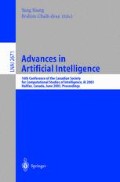Abstract
Mining transaction data by extracting rules to express relationships between itemsets is a classical form of data mining. The rule evaluation method used dictates the nature and the strength of the relationship, eg. an association, a correlation, a dependency, etc. The widely used Apriori algorithm employs breadth-first search to find frequent and confident association rules. The Multi-Stream Dependency Detection (MSDD) algorithm uses iterative deepening (ID) to discover dependency structures. The search bound for ID can be based on various characteristics of the search space, such as a change in the tree depth (MSDD), or a change in the quality of explored states. This paper proposes an ID-based algorithm, ID Gmax, whose search bound is based on a desired quality of the discovered rules. The paper also compares strategies to relax the search bound and shows that the choice of this relaxation strategy can significantly speed up the search which can explore all possible rules.
Access this chapter
Tax calculation will be finalised at checkout
Purchases are for personal use only
Preview
Unable to display preview. Download preview PDF.
References
R. Agrawal, T. Imielinski, and A. Swami. Mining associations between sets of items in massive databases. In ACM-SIGMOD Int. Conf. on Management of Data, pages 207–216, 1993.
R. Agrawal and R. Srikant. Fast algorithms for mining association rules. In The Twentieth VLDB Int. Conf., pages 487–499, 1994.
A. Agresti. Categorical Data Analysis. John Wiley & Sons, New York 1990.
R. J. Bayardo and R. Agrawal. Mining the most interesting rules. In The Fifth Int. Conf. on Knowledge Discovery and Data Mining, pages 145–154, 1999.
R. J. Bayardo, R. Agrawal, and D. Gunopulos. Constraint-based rule mining in large, dense databases. In The Fifteenth Int. Conf. on Data Engineering, pages 188–197, 1999.
S. Brin, R. Motwani, and C. Silverstein. Beyond market baskets: Generalizing association rules to correlations. In ACM-SIGMOD Int. Conf. on The Management of Data., pages 265–276, 1997.
U. M. Fayyad, G. Piatetsky-Shapiro, P. Smyth, and R. Uthurusamy. Advances in Knowledge Discovery and Data Mining. AAAI Press / The MIT Press, 1996.
R. E. Korf. Depth-first iterative deepening: An optimal admissible tree search. In Artificial Intelligence, volume 27, pages 97–109, 1985.
W. Mendenhall, R. Scheaffer, and D. Wackerly. Mathematical Statistics with Applications. Duxbury Press, 3rd edition, 1986.
S. Morishita. On classification and regression. In The First Int. Conf. on Discovery Science — Lecture Notes in Artificial Intelligence., volume 1532, pages 40–57, 1998.
T. Oates and P. R. Cohen. Searching for structure in multiple streams of data. In The Thirteenth Int. Conf. on Machine Learning, pages 346–354, 1996.
T. Oates, M. D. Schmill, and P. R. Cohen. Efficient mining of statistical dependencies. In The Sixteenth Int. Joint Conf. on Artificial Intelligence, pages 794–799, 1999.
G. Piatetsky-Shapiro and W. J. Frawley. Knowledge Discovery in Databases. AAAI Press / The MIT Press, 1991.
C. Silverstein, S. Brin, R. Motwani, and J. Ullman. Scalable techniques for mining causal structures. In Data Mining and Knowledge Discovery, pages 163–192, 2000.
N. R. Vempaty, V. Kumar, and R. E. Korf. Depth-first versus best-first search. In The 9th National Conf. on Artificial Intelligence, pages 434–440, 1991.
Author information
Authors and Affiliations
Editor information
Editors and Affiliations
Rights and permissions
Copyright information
© 2003 Springer-Verlag Berlin Heidelberg
About this paper
Cite this paper
Elazmeh, W. (2003). Search Bound Strategies for Rule Mining by Iterative Deepening. In: Xiang, Y., Chaib-draa, B. (eds) Advances in Artificial Intelligence. Canadian AI 2003. Lecture Notes in Computer Science, vol 2671. Springer, Berlin, Heidelberg. https://doi.org/10.1007/3-540-44886-1_37
Download citation
DOI: https://doi.org/10.1007/3-540-44886-1_37
Published:
Publisher Name: Springer, Berlin, Heidelberg
Print ISBN: 978-3-540-40300-5
Online ISBN: 978-3-540-44886-0
eBook Packages: Springer Book Archive

